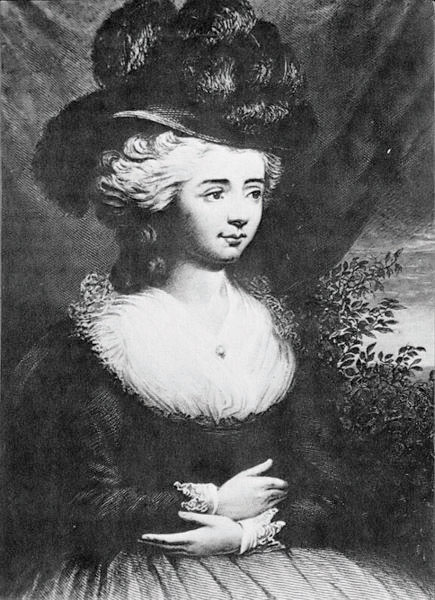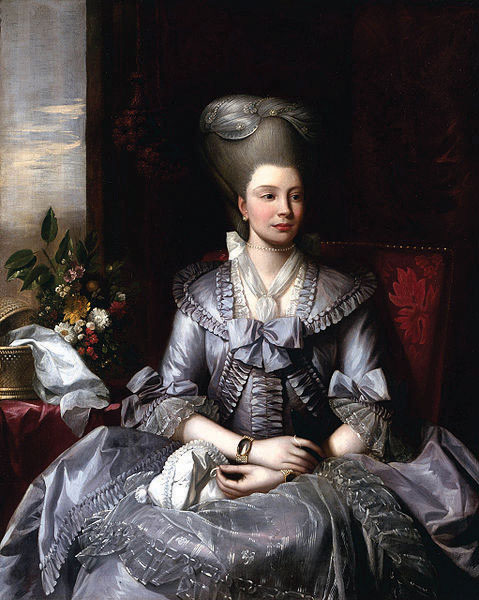This is “Frances Burney [Madame D’Arblay] (1752–1840)”, section 5.4 from the book British Literature Through History (v. 0.1). For details on it (including licensing), click here.
For more information on the source of this book, or why it is available for free, please see the project's home page. You can browse or download additional books there. To download a .zip file containing this book to use offline, simply click here.
5.4 Frances Burney [Madame D’Arblay] (1752–1840)
PLEASE NOTE: This book is currently in draft form; material is not final.
Learning Objectives
- Recognize how Frances Burney’s social status affected her opportunities to develop literary talents.
- Evaluate the literary merits of journals and diaries as well as their role in revealing life in previous time periods.
Biography
Early 20th-century writer Virginia Woolf referred to Frances (often known as Fanny) Burney as the “Mother of English Fiction.” Born into a family of musicians, Burney had little formal education but learned and loved to read and write. Like many early women writers, Burney published her first novel Evelina anonymously, and it met with great success.

Portrait by Edward Francesco Burney.
From her youth, Burney kept a diary and her name figures prominently among the other great diarists of the 18th century such as Pepys, DeFoe, and Fiennes. One of the most chilling passages of any of the diaries is Burney’s account of undergoing a mastectomy without anesthesia in her home. Amazingly, she recovered from the surgery, but she could not bring herself to write about the agonizing ordeal until nine years later when she described it in a letter to her sister.
Text
The following excerpt from an early letter to her father describes her first scheduled meeting with Queen Charlotte, wife of King George III, after Burney, through the influence of a friend, had been appointed to the position of Second Keeper of the Robes.
Sidebar 5.3.
“I do beg of you,” said dear Mrs. Delany, “When the queen or the king speak to you, not to answer with mere monosyllables. The queen often complains to me of the difficulty with which she can get any conversation, as she not only always has to start the subjects, but, commonly, entirely to support them: and she says there is nothing she so much loves as conversation, and nothing she finds so hard to get. She is always best pleased to have the answers that are made her lead on to further discourse. Now, as I know she wishes to be acquainted with you, and converse with you, I do really entreat you not to draw back from her, nor to stop conversation with only answering ‘Yes,’ or ‘No.’”
This was a most tremendous injunction; however, I could not but promise her I would do the best I could.
To this, nevertheless, she readily agreed, that if upon entering the room, they should take no notice of me, I might quietly retire. And that, believe me, will not be very slowly! They cannot find me in this house without knowing who I am, and therefore they can be at no loss whether to speak to me or not, from incertitude.
A PANIC.
In the midst of all this, the queen came!
I heard the thunder at the door, and, panic struck, away flew all my resolutions and agreements, and away after them flew I!
Don’t be angry, my dear father—I would have stayed if I could, and I meant to stay—but, when the moment came, neither my preparations nor intentions availed, and I arrived at my own room, ere I well knew I had left the drawing-room, and quite breathless between the race I ran with Miss Port and the joy of escaping,
from The Diary and Letters of Madame D’Arblay—Volume 1

Queen Charlotte, Consort of King George III by Benjamin West.
Key Takeaways
- Frances Burney exemplifies and records the life of an aristocratic woman in the 18th century.
- Burney is one of several notable diarists from the 18th century.
Exercises
- How would you describe the young woman Frances Burney based only on this excerpt?
- What does this excerpt reveal about the system of social classes in late 18th-century Britain?
- Why does Burney react the way she does?
- Why does Burney feel the need to apologize to her father for her behavior?
Resources
Texts
- The Diary and Letters of Madame D’Arblay—Volume 1 by Fanny Burney. Project Gutenberg.
- The Diary and Letters of Madame D’Arblay—Volume 2 by Fanny Burney. Project Gutenberg.
- The Diary and Letters of Madame D’Arblay—Volume 3 by Fanny Burney. Project Gutenberg.
- Evelina: Or The History of A Young Lady’s Entrance into the World. London: T. Lowndes, 1778; Reprinted New York: W. W. Norton & Company (Norton Library Edition), 1965. rpt. in A Celebration of Women Writers. University of Pennsylvania Libraries.
- Evelina, Or, the History of a Young Lady’s Entrance into the World by Fanny Burney. Project Gutenberg.
Biography
- “Engines of Our Ingenuity: Fanny Burney.” John H. Lienhard. University of Houston. text and audio.
- “Frances Burney (1752–1840).” Valerie Patten. Library and Early Women’s Writing: Women Writers. Chawton House Library.




